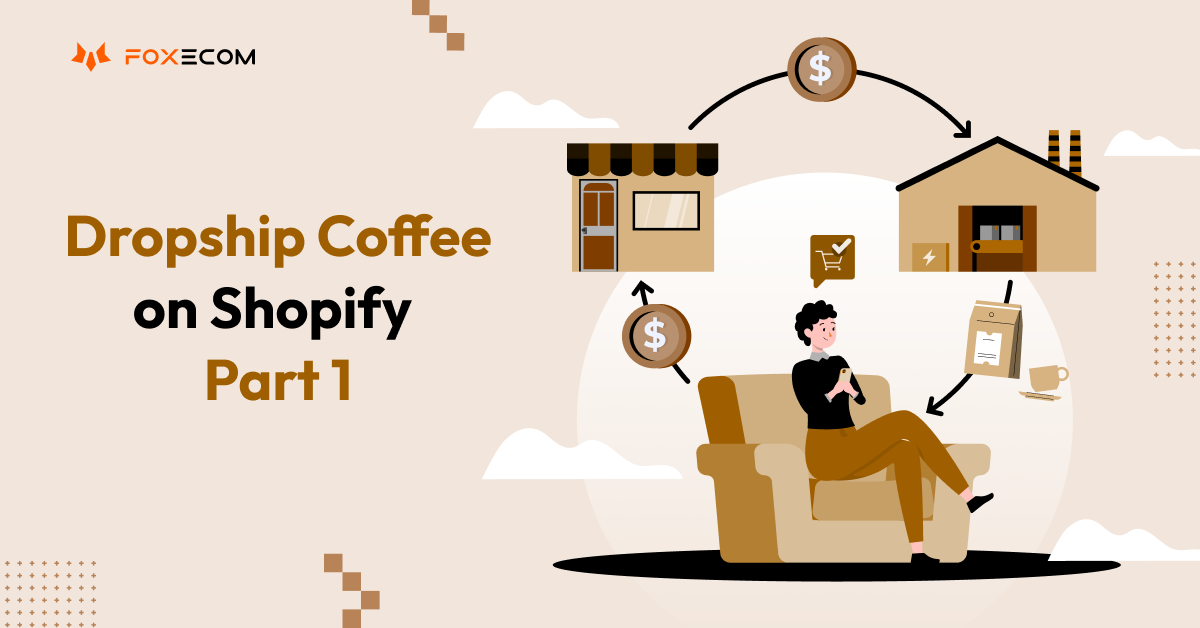As the dropshipping market grows fast at a 23.4% growth rate and brings about alluring profits, this business model now becomes popular in the eCommerce realm and expands outside traditional niches like fashion and electronics to other niches like food and beverage.
Coffee emerged as a lucrative product for dropshipping with many success stories. That’s why more and more merchants want to start their own dropshipping coffee businesses.
In this blog, we'll walk you through the secret behind the rise of Shopify dropshipping and the simple steps to start a dropshipping coffee store!
Why dropship coffee?
First thing first, we need to understand the concept of coffee dropshipping before deep diving into it.
Coffee dropshipping involves partnering with suppliers who source beans from wholesale coffee suppliers, handle the roasting process, and manage order shipments to customers. As the retailer, your role is simplified: attract customers, receive orders, and let the supplier handle the rest, eliminating the need for product storage, fulfillment, and delivery.
Why do so many people want to start their dropshipping coffee store? Here are the reasons for the popularity of dropshipping coffee.
Growing online coffee market
The online coffee market is on the rise, with an anticipated Compound Annual Growth Rate (CAGR) of 9.9% between 2021 and 2028. Notably, the trend of at-home coffee consumption continues to dominate the market, indicating a steady and expanding demand for coffee and related products.
Low investment, no inventory hassles
Dropshipping coffee requires a comparatively lower investment and eliminates the complexities of managing inventory. Normally, it costs about $7,500 - $22,700 to launch and grow an online coffee store by yourself.

With the dropshipping model, you can eliminate the cost of brewing equipment, inventory, and packaging as your suppliers take charge of these tasks. This makes it an attractive option for those looking to enter the coffee business without significant upfront costs and logistical challenges.
For the above reasons, there’s no doubt that coffee can become a trending product in the dropshipping market.
Is dropshipping coffee profitable?
Despite the popularity of dropshipping coffee, many people still wonder “Is dropshipping coffee profitable?”. Unfortunately, the answer is “not always”!
The profitability of dropshipping coffee on platforms like Shopify hinges on strategic considerations. As the coffee product prices are relatively low, you need to sell a lot of units to generate a decent profit.
Thus, you need to focus more on building a brand and cultivating a loyal customer base. If you fail to do it, you may lose your money. In contrast, if you can establish a strong brand presence, dropshipping coffee on Shopify can evolve into a lucrative business endeavor.
How to dropship coffee? 2 simple steps to start a dropshipping coffee store on Shopify
As the coffee industry continues to evolve, now is a strategic moment to explore the realm of dropshipping coffee on Shopify. To help you overcome the aforementioned challenges, we craft a step-by-step guideline on how to dropship coffee on Shopify.
1. Choose the business model
When venturing into the world of dropshipping coffee, your first decision revolves around selecting the right business model for your enterprise. Currently, there are 2 popular models for dropshipping coffee business, which are white-label coffee and private-label coffee. Let’s explore to decide which is suitable for your business.
White-label dropship coffee
In the white-label coffee dropship model, your coffee supplier produces a proven coffee roast, allowing you, the retailer, to sell it under your brand name. The supplier takes care of order fulfillment and shipping, while you have the opportunity to distinguish your brand through custom labels, coffee bag sizes, and pricing.

Pros
- Lower investment: With a pre-existing product, the manufacturer doesn't need to create a new process, resulting in lower costs for you.
- Shorter time to go to market: Instead of creating a product from scratch, you can start selling quickly by ordering a tried-and-tested product and branding it with your logo.
- Tested quality: The product has often been pretested in the market, assuring its success.
Cons
- Limited product choices: Your options are confined to the white-label products the manufacturer produces, limiting your ability to offer unique, tailor-made items.
- Intense competition: Since your products share similarities with others using the same manufacturers, standing out becomes challenging, potentially leading to a lack of brand differentiation.
Private label coffee dropship
Another compelling business model within the realm of dropshipping coffee is the private label coffee dropship. This model allows retailers to actively participate in the product development process, including the creation of new coffee blends. Unlike traditional coffee shops, the majority of the work occurs at the supplier level.

Pros
- More control over products: Private label coffee dropship model allows you to specify your requirements to the manufacturer, ensuring higher levels of quality control and brand identity management.
- Unique products: Private label coffee dropship sets you apart by offering products exclusive to your brand, differentiating you from competitors using white-labeling.
- Increased profit margins: The exclusivity of private-label products empowers you to set more competitive prices, allowing for enhanced profit margins.
Cons
- Higher initial investment: Engaging in the development process may require a higher initial investment compared to white-label drop shipping.
- Extended development time: Creating exclusive blends and products may take longer, affecting the time it takes to launch your store.
- Greater responsibility: While you have more control, this comes with added responsibilities in overseeing product development and quality assurance.
Choosing between the white-label coffee dropship and private label coffee dropship involves considering your business goals and preferences. White-label coffee dropship offers a quicker entry into the market with lower costs, while private label provides more control and exclusivity. To make an informed decision, you should weigh the pros and cons of each model based on your business strategy.
2. Find the right dropshipping coffee niche and product
Once you've chosen your business model, the next crucial step is identifying the right niche and products to maximize your dropshipping coffee store's success.
How to find a suitable niche
Determining a niche market can be a nuanced task, but it's pivotal for your dropshipping venture. Start by asking yourself key questions to uncover potential niches:
- Who is your ideal customer?
- What are their specific needs and pain points?
- What problems could your products solve for them?
Understanding your target audience and their preferences is essential for honing in on a niche that aligns with market demand.
To learn more about how to choose a niche for your dropshipping coffee business, you can refer to Shopify's guide.
Trending coffee niches and products to sell
If you haven’t come up with which to sell, here are some recommendations for you:
Artisanal and specialty blends
Artisanal and specialty coffee is one of the proven coffee trends this year as 52% of US consumers aged 18 or above reported drinking specialty coffee in the previous week. This increased to 62% for those aged between 25 and 39.
Specialty coffee also receives a high interest from coffee consumers as it’s a trending keyword on Google Trends this year.

Hence, artisanal and specialty blends can be profitable for dropship.
Target customers
Target coffee enthusiasts and connoisseurs who appreciate high-quality and unique flavor experiences.
Product ideas
- Flavored specialty coffee: Infuse your blends with unique flavors like vanilla, cinnamon, or exotic spices to captivate diverse taste preferences
- Limited edition reserve blends: Create an air of exclusivity with small-batch, limited-time offerings for true coffee lovers.
Organic and sustainable coffee
Sustainability is a growing priority among consumers, and with the frequently-purchased products like coffee, customer interest in sustainability and ethical values is the highest. Thus, organic and sustainable coffee can be a potential niche for dropship coffee.
Target customers
Consumers who prioritize environmentally sustainable and ethical practices.
Product ideas
- Organic single-origin coffee: The coffee sourced from specific regions showcases your commitment to sustainable and ethical coffee production.
- Eco-friendly coffee pods: Provide a convenient and sustainable option for those seeking a single-serving solution without environmental impact.
Healthy coffee
With a growing awareness of health trends, health-conscious consumers seek coffee aligned with their wellness goals, and healthy coffee has become a trend in coffee consumption.
Target Audience
Health-conscious consumers who prioritize well-being in their lifestyle choices, including their coffee consumption.
Product ideas
- Functional coffee blends: Infuse your coffee with health-boosting ingredients like collagen, vitamins, minerals, or herbs to create blends that not only satisfy taste buds but also contribute to overall well-being.
- Mushroom coffee: Combine ground medicinal mushrooms and dark coffee beans to produce a smooth, nutty brew with a unique benefits of improving immunity and reducing anxiety. Thus, mushroom coffee dropshipping is a potential niche for you to try as this type of coffee receives lots of interest around the world and always ranks in the top search queries related to coffee on Google.

- Low-acidity coffee: Develop a line of coffee with reduced acidity, catering to individuals seeking a gentler option for digestive well-being.
In Conclusion
Embarking on the lucrative journey of dropshipping coffee on Shopify demands a throughout understanding of the market. In part 1 of this comprehensive guide, we unveiled the reasons behind coffee's popularity in dropshipping, navigated the pivotal decision of choosing a business model, and explored trending niches like artisanal blends and health-conscious offerings.
However, market knowledge isn’t enough for a successful dropshipping coffee store as in this market, your success leans on the supplier, the storefront design, and your marketing strategies.
Thus, in the next part, we will guide you through how to choose the right suppliers, and recommend you the best coffee dropshipping suppliers for Shopify stores. Also, we'll give tips to set up and design a store that converts, and how to market your coffee brand effectively.




